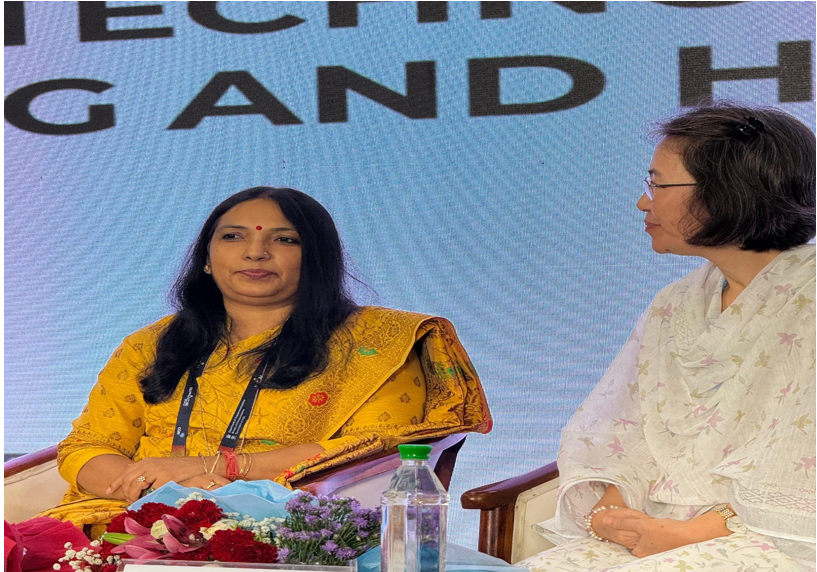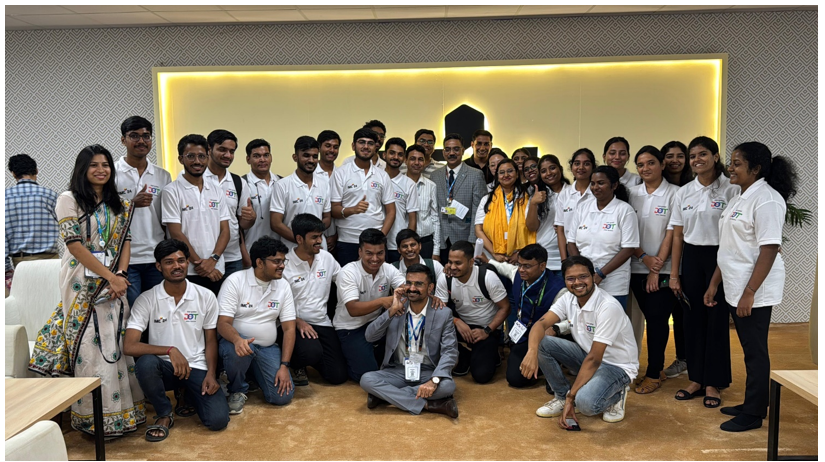Ministry of Communications
ITU-WTSA 2024 organises ‘Safe Listening Workshop’ to advocate the responsible use of technology
Over a billion young people worldwide are at risk of avoidable hearing loss due to unsafe listening practices: WHO
प्रविष्टि तिथि:
18 OCT 2024 8:00PM by PIB Delhi
ITU-WTSA 2024 which is being held in New Delhi hosted a joint ITU-WHO Workshop on Safe Listening, addressing the urgent global public health crisis of hearing loss, and the dangers posed by unsafe listening practices. With the statistics showing over 1 billion young people at risk of hearing loss due to unsafe listening, the workshop underscored the importance of collective action in ensuring that safe listening practices become a global norm. In response to this growing public health problem, WHO launched the Make Listening Safe initiative in 2015, with the aim of preventing hearing loss through hearing conservation.

The inaugural session was attended by Nidhi Khare, Secretary, Department of Consumer Affairs, India, Dr. P. Payden, Deputy Head, WHO country Office, India and Hemendra Kumar Sharma, Deputy Director General (Media) & Spokesperson, Department of Telecommunications, Ministry of Communications, India. Renowned musician Ricky Kej moderated the session.
Speaking at the workshop, Ms. Nidhi Khare, Secretary, Department of Consumer Affairs said “It is important for policy makers and regulators to develop standards not only for manufacturers but also for users and services. There should be education & training for tracking sound exposure, on the lines of tracking other health parameters like calorie intake & footsteps.” She further highlighted Indian cultural practices which are aligned towards this cause and said “In our culture, there's a festival ‘Mauni Amavasya’, in which one is supposed to keep quiet & fast. Perhaps, relishing the sound of silence. I think that is extremely therapeutic and we must realise that together, we can create a difference for not only India, but for the world at large.”
P. Payden, Deputy Head, WHO country Office, India, said “The cascading consequences of hearing loss translates into millions facing communication challenges, diminished quality of life, and potential impact on professional development/education. Besides, noise-induced hearing loss in children can impair language acquisition, leading to learning disabilities and increased anxiety. Untreated hearing loss can lead to isolation, depression, and cognitive decline. However, she also emphasized that there is good news as well, and noise-induced hearing loss is preventable by adopting safe listening habits. She further mentioned that the global ITU standard for safe listening devices and systems provides a framework for incorporating features into personal audio devices, such as acoustic symmetry which monitors a sound allowance for a given period. Features that give a warning when users reach 100% of their weekly sound allowance.
She concluded by saying “WHO is committed to promoting safe listening practices through research. Dissemination of evidence-based guidance and collaborating with stakeholders to create safe listening. Hearing loss is irreversible, but it's preventable.”
Addressing the stakeholders, Hemendra K Sharma, Dy Director General & Spokesperson, DoT said that over 5% of the world's population require rehabilitation for disabling hearing loss, including 34 million children and that, it requires two pronged approach of having right regulation and plenty of awareness. He informed the audiences about the DoT’s Sanchar Mitras, the student volunteers, who are creating awareness of citizen centric services of department. 30 such Sanchar Mitras from across the country were participating in the workshop and were urged by Sharma to take the message of safe listening practices to citizens.

A detailed presentation on the subject was given by ITU and WHO. Simao Campos, Counsellor,ITU-T spoke about the relevance of standardization to drive change in the health sector including hearing health. He outlined how behaviour change can be motivated through implementation of standards and regulation. Dr Shelly Chadha, Technical Lead, Ear and Hearing Care, WHO spoke about the Global Standards for Safe Listening and other WHO efforts to make listening safe. She outlined WHO’s philosophy on safe listening, what the standard is about, how it can be implemented.
A panel discussion was also held on implementing the ‘Safe listening Standard: Motivations and Challenges brought together representatives from standardization organizations, private sector entities, governments, and users. The panellist included Mr Masahito Kawamori, Keio University (Japan), Mr Karl Brookes, Sony (UK), Dr Kapil Sikka, AIIMS Delhi (India). The panel explored various aspects, including potential pitfalls and solutions for compliance, and actions to promote safe listening practices. Special focus was on implementing these standards, highlighting the unique challenges and rationales. The discussion also delved into the user perspective, emphasizing the benefits, challenges, and overall impact of safe listening. Mahima Sharma and Sanchar Mitra, Ms S J Varshaa shared their insights, adding a fresh perspective to the conversation reminding the audience that this issue deeply affects the younger generation.
The session concluded with a call for continued global collaboration, emphasizing that coordinated efforts between governments, industry, and organizations like WHO and ITU are essential for advancing the adoption of safe listening standards.
These discussions and developments are part of the side events of the ongoing WTSA 24 & IMC24 being held in New Delhi. The event marks the beginning of a new chapter in India’s digital journey, reinforcing the country's commitment to becoming a global leader in advanced communication technologies.
*****
SB/DP/ARJ
(रिलीज़ आईडी: 2066212)
आगंतुक पटल : 846